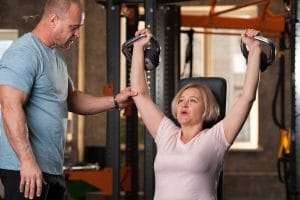
Strength Training and Heart Health
Everyone says they want to stay “young at heart.”
But are they willing to lift weights to do it?
Conventional wisdom has long held that running is better for heart health than weightlifting.
Some research says that’s not so.
For example, in one survey, scientists looked at health records of 4,000 people. They concluded that, while both forms of exercise lower the risk of heart disease, weightlifting has a greater effect than running, walking or cycling, according to the British Telegraph. The study also supports earlier views that weightlifting is better for the circulatory system because the “oxygen expenditure” is more intense.
In the United States, February is American Heart Month, sponsored by the American Heart Association, to raise awareness and to help people lose weight, eat better, invigorate their exercise routines and more.
Heart disease is the country’s No. 1 killer, responsible for 1 in 4 deaths and 735,000 heart attacks annually, according to the U.S. Centers for Disease Control.
The good news: Heart disease can be prevented. Exercise and eating right are the top tools to improve our heart health and lower our risk for heart disease and heart attacks, according to the American Heart Association.
Exercise Is Crucial
Heart disease includes stroke, high blood pressure, heart attacks and coronary disease.
For people over 50, exercise is vital – and that includes strength training. As most people age, their hearts get smaller and weaker, and major arteries can stiffen. That reduces or slows blood flow through the body.
All adults lose muscle mass as we get older – unless we train to minimize that loss.
Weightlifting among mature adults improves heart health by decreasing blood pressure and “bad” cholesterol while improving “good” cholesterol. Exercising and eating right also fight obesity, which contributes to heart issues.
Any exercise is good, of course. And weightlifting (or resistance training) also has other health benefits for people over 50. For example, it helps improve functional independence. And if you’re worried that “weightlifting” means “huge, bulky bodies,” rest assured: It’s just not the case.
Science Confirms Benefits Later In Life
Other studies suggest physical activity is good for your heart no matter what your age.
Being active keeps your heart stronger and healthier than being inactive. Physical activity can help control blood pressure, according to The National Institutes of Health.
That doesn’t mean you have to devote your life to the gym. Brisk walking – say, 20 minutes a day – is a great start. Regular exercise at a gym, fitness studio, pool or yoga class can bring even greater heart-health rewards.
The American College of Cardiology found that women over 70 who got at least some exercise were 11 percent less likely to develop heart failure than women who had no activity. Women with the most activity were 35 percent less likely to get heart disease.
The research is consistent, but there’s still no easy fix. You have to do the work to gain the benefits.
Are you willing to add strength training to a healthy lifestyle? I’m here to show you how. Simply contact me to request a FREE discovery call and get started today!
